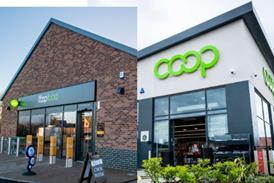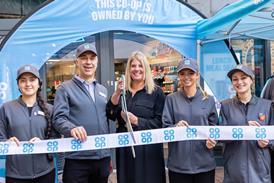Avian flu, terrorism, flooding or power cut - could you carry on running your business if a disaster struck? Andrew Don reports on contingency planning in uncertain times.
At 6.25am on Sunday, December 11, 2005, Emma Lebrun was working at the Balfour store in Hemel Hempstead. One minute later, an explosion ripped through the nearby Buncefield oil depot, followed by a second at 6.27am.
The shop got off lightly: it was far enough away not to suffer any damage, although trade was quieter the following Monday. But Emma fared worse and the shock of the blast meant she was off work for two weeks, unable to eat or sleep because of the trauma.
The more stores a company has, the more chance one of them will face some sort of disaster at some point. But that does not mean the single-store convenience operation can be blasé. Tracy Lane de Court, one of the owners of Cornish Stores, which was wrecked in the Boscastle deluge of August 16, 2004, admits she didn’t have a contingency plan at the time. “We didn’t dream of it when we were thinking of buying the property. We were told it wasn’t a flood risk,” she says.
One of the mistakes Tracy and her husband Guy made was to shut the doors when the water approached. It would have run in the front door and out the back if they had left them open. Instead, when the water got into the building, there was nowhere for it to escape and the shop incurred far greater damage.
A contingency plan would have allowed for this. It could have also specified things that might seem obvious, but which in the panic of the moment the Lane de Courts overlooked, such as leaving the till on the counter, which was washed away, and keeping accounts in a briefcase at the mercy of the water.
Tracy says: “It’s a good idea to sit down and consider what the different disaster scenarios could be and write a plan of how to deal with them.”
She advises having a close look at insurance. Many independents buy off-the-shelf shop packages but anything that's different from the norm about your shop could leave you under-insured.
Cornish Stores, for example, had far more stock in the shop in the summer when the flood struck than in the winter and, as such, found it was under-insured. “If you do anything to your shop and buy anything new, check you're covered,” says Tracy. “Work out how much it would cost to replace absolutely everything.”
The Lane de Courts were one of those couples who thought disasters would always happen to someone else but, as Association of Convenience Stores public affairs manager James Lowman says: “It will never happen until it does.”
Disasters come in many forms: on July 28 last year a freak tornado struck Moseley, Birmingham, ripping off roofs and smashing windows. And in 2001, the foot and mouth epidemic struck, devastating businesses in rural locations that had relied on tourists making use of local footpaths. And we all face the constant threat of terrorism with the July 7 London bombings all too fresh a reminder. But other incidents are more common and could affect any c-store at any time - for example, power cuts, systems failure, arson and other criminal acts.
“Most people don’t insure for every eventuality but they do need to think about not just the immediate cost of damage to buildings but the cost of not running the business,” says Lowman. “How do you keep staff on if you’ve got no business coming in? You have to think through the full effects.”
Budgens and Londis both had comprehensive plans for coping with natural disasters before coming together with Musgrave as Musgrave Budgens Londis (MBL). These plans have been reviewed and reformulated to reflect the new business structure.
MBL has a clearly documented escalation procedure for each division in response to disasters. Each division reports to the disaster recovery committee, comprising members of the MBL board. All Budgens’ corporate-owned stores and buildings are protected by separate cover against terrorism, and property and business interruption.
Its independent retailers are given details of recommended brokers who will provide full business insurance cover, which in many cases will include flood risk.
Communications director Rod Alexander says: “With regard to specific disasters, there will inevitably be a number of incidents during the course of the year among the 2,250-plus stores.One store, which was subjected to a particularly damaging ram raid, was trading again within a couple of days, even though it was some weeks before the store was back to its original state.
“All independent retailers are expected to advise MBL immediately of any such incidents so that we can support then in restoring their business to normal trading as soon as possible.”
The Co-operative Group has a business continuity programme in place to mitigate and plan for incidents 'of a physical nature'. The programme is not scenario-specific because it's designed to be flexible enough to deal with a range of incidents.
The group is also developing its ability to deal with the impact of a major illness outbreak. The Co-op focuses its planning efforts on critical functions such as supply chain, trading, operations, human resources, IT and facilities, for example, to ensure the continuity of service to its customers.
The original incentive for the Co-op’s business continutity planning stemmed from the IRA explosion in Manchester city centre on June 15, 1996, when its head office was made inaccessible because it fell within the police cordon.
Subsequent incidents such as a power cut affecting the entire head office complex, flooding in a major server room and central heating failure on one of the coldest days in winter have all served as reminders of the requirement for business continuity planning.
Business continuity manager Katherine Morris points out: “Events of this type demonstrate that we should always be aware of the threat of 'quiet' catastrophes and try to plan for them as far as possible."
The Co-op's programme covers critical areas of crisis management such as impact analysis, plan development and maintenance, testing and awareness. And the Group subscribes to a third-party recovery provider to undertake emergency work and system recovery. Regular rehearsal and training sessions are held with various teams involved in the continuity programme.
Kitty Robinson, head of Blue Rubicon’s crisis management unit, says that Wal-Mart in the US was days ahead of the US Federal Emergency Management Agency during Hurricane Katrina last year and won numerous accolades in the aftermath of the disaster for its actions in managing to reach people who were stranded.
Robinson cites the example of the Tesco Gerrards Cross tunnel collapse last June, which took everyone by surprise. “So far, addressing this issue has cost the company £8.5m. Tesco had to pay for an advertising campaign to win back the customers it lost as a result of the collapse and it now faces another compensation claim for future damage to the train operator’s business.”
Now, with the threat of an avian flu pandemic that could cut a swathe out of the working population, the time has never been better to draw up or reassess your contingency plans, especially in the area of human resources. Robinson says: “Think about what would happen if human resources was the one thing you no longer had in abundant supply. How would they cope?
“Convenience stores also need to think about what people might want to stock up on if the bird flu pandemic becomes a real threat in the UK. They also need to consider about how their own staff might respond, and what they could do to alleviate staff concerns.”
Planning for Disaster
Complete a business impact analysis: identify business processes, work out what impact it could have on your customers, legal implications, and impact on reputation and profit
Devise a continuity plan: what needs to be done, when, by whom, how and where
Test the plan by walkthrough exercises and systems tests
Publicise the plan through familiarisation visits to the recovery site, team meetings, intranet and awareness campaigns
Source: Co-op Group
At 6.25am on Sunday, December 11, 2005, Emma Lebrun was working at the Balfour store in Hemel Hempstead. One minute later, an explosion ripped through the nearby Buncefield oil depot, followed by a second at 6.27am.
The shop got off lightly: it was far enough away not to suffer any damage, although trade was quieter the following Monday. But Emma fared worse and the shock of the blast meant she was off work for two weeks, unable to eat or sleep because of the trauma.
The more stores a company has, the more chance one of them will face some sort of disaster at some point. But that does not mean the single-store convenience operation can be blasé. Tracy Lane de Court, one of the owners of Cornish Stores, which was wrecked in the Boscastle deluge of August 16, 2004, admits she didn’t have a contingency plan at the time. “We didn’t dream of it when we were thinking of buying the property. We were told it wasn’t a flood risk,” she says.
One of the mistakes Tracy and her husband Guy made was to shut the doors when the water approached. It would have run in the front door and out the back if they had left them open. Instead, when the water got into the building, there was nowhere for it to escape and the shop incurred far greater damage.
A contingency plan would have allowed for this. It could have also specified things that might seem obvious, but which in the panic of the moment the Lane de Courts overlooked, such as leaving the till on the counter, which was washed away, and keeping accounts in a briefcase at the mercy of the water.
Tracy says: “It’s a good idea to sit down and consider what the different disaster scenarios could be and write a plan of how to deal with them.”
She advises having a close look at insurance. Many independents buy off-the-shelf shop packages but anything that's different from the norm about your shop could leave you under-insured.
Cornish Stores, for example, had far more stock in the shop in the summer when the flood struck than in the winter and, as such, found it was under-insured. “If you do anything to your shop and buy anything new, check you're covered,” says Tracy. “Work out how much it would cost to replace absolutely everything.”
The Lane de Courts were one of those couples who thought disasters would always happen to someone else but, as Association of Convenience Stores public affairs manager James Lowman says: “It will never happen until it does.”
Disasters come in many forms: on July 28 last year a freak tornado struck Moseley, Birmingham, ripping off roofs and smashing windows. And in 2001, the foot and mouth epidemic struck, devastating businesses in rural locations that had relied on tourists making use of local footpaths. And we all face the constant threat of terrorism with the July 7 London bombings all too fresh a reminder. But other incidents are more common and could affect any c-store at any time - for example, power cuts, systems failure, arson and other criminal acts.
“Most people don’t insure for every eventuality but they do need to think about not just the immediate cost of damage to buildings but the cost of not running the business,” says Lowman. “How do you keep staff on if you’ve got no business coming in? You have to think through the full effects.”
Budgens and Londis both had comprehensive plans for coping with natural disasters before coming together with Musgrave as Musgrave Budgens Londis (MBL). These plans have been reviewed and reformulated to reflect the new business structure.
MBL has a clearly documented escalation procedure for each division in response to disasters. Each division reports to the disaster recovery committee, comprising members of the MBL board. All Budgens’ corporate-owned stores and buildings are protected by separate cover against terrorism, and property and business interruption.
Its independent retailers are given details of recommended brokers who will provide full business insurance cover, which in many cases will include flood risk.
Communications director Rod Alexander says: “With regard to specific disasters, there will inevitably be a number of incidents during the course of the year among the 2,250-plus stores.One store, which was subjected to a particularly damaging ram raid, was trading again within a couple of days, even though it was some weeks before the store was back to its original state.
“All independent retailers are expected to advise MBL immediately of any such incidents so that we can support then in restoring their business to normal trading as soon as possible.”
The Co-operative Group has a business continuity programme in place to mitigate and plan for incidents 'of a physical nature'. The programme is not scenario-specific because it's designed to be flexible enough to deal with a range of incidents.
The group is also developing its ability to deal with the impact of a major illness outbreak. The Co-op focuses its planning efforts on critical functions such as supply chain, trading, operations, human resources, IT and facilities, for example, to ensure the continuity of service to its customers.
The original incentive for the Co-op’s business continutity planning stemmed from the IRA explosion in Manchester city centre on June 15, 1996, when its head office was made inaccessible because it fell within the police cordon.
Subsequent incidents such as a power cut affecting the entire head office complex, flooding in a major server room and central heating failure on one of the coldest days in winter have all served as reminders of the requirement for business continuity planning.
Business continuity manager Katherine Morris points out: “Events of this type demonstrate that we should always be aware of the threat of 'quiet' catastrophes and try to plan for them as far as possible."
The Co-op's programme covers critical areas of crisis management such as impact analysis, plan development and maintenance, testing and awareness. And the Group subscribes to a third-party recovery provider to undertake emergency work and system recovery. Regular rehearsal and training sessions are held with various teams involved in the continuity programme.
Kitty Robinson, head of Blue Rubicon’s crisis management unit, says that Wal-Mart in the US was days ahead of the US Federal Emergency Management Agency during Hurricane Katrina last year and won numerous accolades in the aftermath of the disaster for its actions in managing to reach people who were stranded.
Robinson cites the example of the Tesco Gerrards Cross tunnel collapse last June, which took everyone by surprise. “So far, addressing this issue has cost the company £8.5m. Tesco had to pay for an advertising campaign to win back the customers it lost as a result of the collapse and it now faces another compensation claim for future damage to the train operator’s business.”
Now, with the threat of an avian flu pandemic that could cut a swathe out of the working population, the time has never been better to draw up or reassess your contingency plans, especially in the area of human resources. Robinson says: “Think about what would happen if human resources was the one thing you no longer had in abundant supply. How would they cope?
“Convenience stores also need to think about what people might want to stock up on if the bird flu pandemic becomes a real threat in the UK. They also need to consider about how their own staff might respond, and what they could do to alleviate staff concerns.”
Planning for Disaster
Complete a business impact analysis: identify business processes, work out what impact it could have on your customers, legal implications, and impact on reputation and profit
Devise a continuity plan: what needs to be done, when, by whom, how and where
Test the plan by walkthrough exercises and systems tests
Publicise the plan through familiarisation visits to the recovery site, team meetings, intranet and awareness campaigns
Source: Co-op Group


























No comments yet